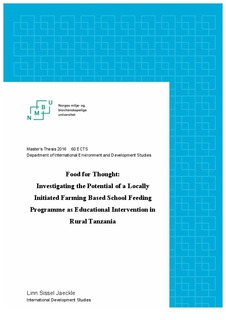| dc.contributor.advisor | Krogh, Erling | |
| dc.contributor.advisor | Gjøtterud, Sigrid | |
| dc.contributor.author | Jaeckle, Linn Sissel | |
| dc.coverage.spatial | Tanzania | nb_NO |
| dc.date.accessioned | 2016-08-19T07:49:57Z | |
| dc.date.available | 2016-08-19T07:49:57Z | |
| dc.date.issued | 2016-08-19 | |
| dc.identifier.uri | http://hdl.handle.net/11250/2399954 | |
| dc.description.abstract | Low-income countries like Tanzania, are financially limited and cannot afford a nation wide school feeding programme. 75% of Tanzanian schools do not have a school feeding programme - innovative and cost-efficient approaches to school feeding programme that are thus needed. The research explores the potential of locally owned farming based school feeding programmes to act as an educational intervention.
In the framework of action research I studied a school that was running a school feeding programme, sourcing the food on its own farm and independently from any external government or NGO input. Action research and Freire’s (2000) concept of dialectic discourse set the methodological and theoretical framework of the research approach.
The goal of this research was two fold: to better understand the potential of a farming based school feeding programme to decrease hunger, increase enrolment and improve education outcomes, and to collaborate with stakeholders of the case study to identify actions that could further improve the school feeding programme. Through participatory action research with stakeholders we derived possible actions to manage and improve identified and agreed-on deficits. This process showed two things: 1) The potential of action research as a mediating and enabling tool for critical consciousness through offering a platform of mediated dialogue. 2) The potential capacity of stakeholders of the Kibuko programme to influence their environment.
The evidence of the research suggests that in-house farming based school feeding programmes have potential to improve children’s educational situation. The beneficial impact on education has been traced back to the provision of food through the school feeding programme. Analysis strongly suggests that educational improvement cannot solely be attributed to the provision of food at school. The sourcing method of the food – the school farm - contributed to the children’s improved educational performance as well. The duel holistic impact of the school feeding programme and school farming changed learning conditions at school and thus enabled an improvement in the learning outcome. | nb_NO |
| dc.language.iso | eng | nb_NO |
| dc.publisher | Norwegian University of Life Sciences, Ås | |
| dc.rights | Navngivelse-Ikkekommersiell-IngenBearbeidelse 3.0 Norge | * |
| dc.rights.uri | http://creativecommons.org/licenses/by-nc-nd/3.0/no/ | * |
| dc.subject | school feeding programme | nb_NO |
| dc.subject | school garden | nb_NO |
| dc.subject | school farm | nb_NO |
| dc.subject | education | nb_NO |
| dc.subject | hunger | nb_NO |
| dc.subject | educational intervention | nb_NO |
| dc.subject | development | nb_NO |
| dc.subject | Tanzania | nb_NO |
| dc.subject | action research | nb_NO |
| dc.title | Food for Thought : investigating the potential of a locally initiated farming based school feeding programme as educational intervention in rural Tanzania | nb_NO |
| dc.type | Master thesis | nb_NO |
| dc.subject.nsi | VDP::Humanities: 000 | nb_NO |
| dc.subject.nsi | VDP::Social science: 200 | nb_NO |
| dc.source.pagenumber | 143 | nb_NO |
| dc.relation.project | EPINAV | nb_NO |
| dc.description.localcode | M-DS | nb_NO |

